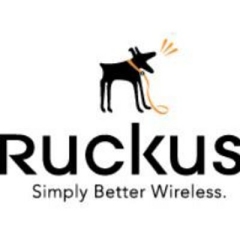What is our primary use case?
In terms of the use case for Ruckus Wireless WAN, we have a WiFi First network design, so that's how we connect. We got rid of 50 percent of our ports, so WiFi First, it's mostly enterprise, and then in our malls, it's where we connect to a shopping center's WiFi while advertising and also focus advertising on products and specials inside the mall.
What is most valuable?
The best feature of Ruckus Wireless WAN apart from its seamless roaming feature where you roam beautifully on the network is its analytics tool that gives you so much insight into your deployment, so it has become more of a business intelligence type of tool as well.
I also like that Ruckus Networks, in terms of WiFi security issues on the WiFi protocols, is also the first company to give you notices of security issues, and also the first to provide patches for those issues. Ruckus Wireless WAN is very proactive and much, much faster than Cisco, Aruba, and Meraki.
What needs improvement?
In terms of room for improvement in Ruckus Wireless WAN, I cannot find a fault with it. It's pretty decent and it deploys easily. The product is also easily maintained. It has very few issues. The RMA process in Ruckus Wireless WAN also works brilliantly. There is nothing I can think of at the moment. I'm not an engineer.
Pricing could be improved in Ruckus Wireless WAN because obviously, everybody wants things to become cheaper. Another room for improvement in the product is from a delivery perspective, particularly the heavy delivery delays because of the chip shortage that a lot of manufacturers have to deal with. The chip shortage is not coming to an end, but Ruckus Networks has to make a plan because the ETA has slipped out from the average of three months on switches to fourteen months, which is very, very rough on the industry at the moment. Ruckus Wireless WAN could lose business to Chinese competitors, for example, HTC has a good wireless solution that I haven't tested yet, other than on POC, and it works great. I haven't yet experienced the HTC wireless solution in large deployments, so you never know how it's going to go, but HTC has managed to circumvent the chip shortage, so the ETA provided by HTC is much more preferred than the ETAs provided by Ruckus Networks, Cisco, and Aruba products.
What I would love, from a service delivery management perspective, is for Ruckus Wireless WAN to look at things like repeat offenders and best practices such as "your power settings on your APs are too high or too specific". APs are constantly fighting for airspace and it would be good if there was some type of analytics in the background that shows you the little nitty-gritty repeat offenders, instead of always looking at the big issue picture. It would be good for the product to focus on the small issue picture as well.
In the next release of Ruckus Wireless WAN, I would also like it to focus on the small things that optimize opportunities within a wireless network because if you sit with a network with five thousand access points, sometimes two APs are too close to one another or are on the same channel, and though auto channel settings sound very cool, if a third party comes in with a wireless device that's on channel sixty for five gigahertz, then that specific Ruckus AP might try to change the channel to another channel, but then the access point next to it needs to change, and so does the access point next to it, and it becomes a ripple effect of changing channels, just because a third party user is interfering with your channel. This sounds cool, but it creates so much overhead on your resources for your access points that it's not worth it because that person will just move along and then cause more confusion as he works with that device. If it's a static device, then an AP can just tell you that there's a third-party device that is interfering with a specific access point so that you can go to the site, locate the third-party device, and negotiate with the third-party owner to change the channel or lower the power settings.
Ruckus Wireless WAN having a more focused approach than a blanket approach is what I'd like to see in its next release.
For how long have I used the solution?
I've been using Ruckus Wireless WAN for five years now.
What do I think about the stability of the solution?
Ruckus Wireless WAN is a very stable product.
What do I think about the scalability of the solution?
Ruckus Wireless WAN is a very scalable product.
How are customer service and support?
I haven't contacted the technical support for Ruckus Wireless WAN, but based on the emails I've read from the engineering department, the response time of the support team is very fast. Technical support for Ruckus Wireless WAN is very proactive, and it's a pleasure working with support. On a scale of one to five, with one being bad and five being excellent, I would rate support five out of five, particularly compared to other vendors.
Which solution did I use previously and why did I switch?
My company decided to work with Ruckus Wireless WAN because of its price and scalability. Its licensing is very uncomplicated compared to Aruba and Cisco where the licensing structure is much more complicated. Ruckus Wireless WAN is easier to work with from a commercial perspective, and it is a very good technology. Ruckus Networks has a very strong R&D department that's constantly coming up with innovations. The product is a market trendsetter rather than a follower. Ruckus Networks also foresee future utilization. The radios on Ruckus Wireless WAN keep on improving and there's this amazing smart team functionality on radios that minimizes end-user connects and disconnects from the network. There's also a smooth handover from one access point to another. Ruckus Wireless WAN is good technology. My company researched technology and commercials, and on the decision matrix, this product came out at the top.
How was the initial setup?
Ruckus Wireless WAN is easy to set up. It's very quick to deploy. Once you set up your wireless LAN controller and you start deploying access points, you can deploy the product out-of-the-box. Ruckus Wireless WAN has a self-updating function, and it immediately knows where to go. It's very easy to deploy.
What about the implementation team?
The deployment of Ruckus Wireless WAN was done in-house. You can deploy an entire hotel in one day from installation to commissioning, etc. If your backbone is working and your routing is up, then the product is very easy to deploy. It's definitely not a long, painful process.
What's my experience with pricing, setup cost, and licensing?
Licensing for Ruckus Wireless WAN when you compare it to other vendors, it's on par and not expensive. For me, all licensing is expensive by default, but you do get lifelong licenses, and what's cool about it is the license for Ruckus Wireless WAN, especially on the LAN controller, is not linked to an access point. It's just a quantity access point deployment, so you can rip out old APs, and put new ones in and they'll work on the wireless LAN because the license is not linked to a specific access point which is much easier to work with.
Which other solutions did I evaluate?
I evaluated Cisco, Aruba, and Meraki.
What other advice do I have?
I'm not an engineer, but I do manage the Ruckus Wireless WAN deployment project and the network, and I've used it myself. My company is still using the product.
At the moment, some of the customers are already on the new version of Ruckus Wireless WAN. Some customers are upgraded and are on the old version because the nice thing about that product is that you can use it for ten years, but the upgrade paths at a point stop for an old device, so you'll see you can only upgrade it to a certain point. My company maintains that until the customer embarks on a network refresh where you rip and replace your old kit with the new kit, so my company works on various versions of Ruckus Wireless WAN. It all depends on the model number. Currently, in the region, my company has fourteen thousand Ruckus access points under management, and then for SmartZones or Virtual SmartZones or controllers, there are approximately eighteen wireless LAN Ruckus controllers under management.
In terms of how Ruckus Wireless WAN is deployed, for some customers, it's on the public cloud, while for some, it's on-premises. Some have hybrid cloud setups. It all depends on what the customer requires. Some customers want full control over everything, while others share a Virtual SmartZone with other customers, just under different zones.
Everybody in my company uses Ruckus Wireless WAN, and from a customer perspective, eighteen big customers use it. Customers are in the food deployment, hospitality, hospitals, and schools industries. Schools use the product a lot. Private schools in South Africa use Ruckus Wireless WAN a lot because these days, COVID has forced education to go online, so my company had a massive rollout on those access points.
In terms of why someone would not use Ruckus Wireless WAN, wireless LAN is an expensive exercise, so on the day that you submit your tender, it would still depend on what the customer looks for. The customer might look for a cheaper solution. It would depend on what solution the customer chooses, but a big company usually chooses between Juniper Mist, Aruba, and Ruckus Networks. It could also be because the company has invested so much in Cisco that it just doesn't make financial sense to go with another solution or because the company uses Cisco Meraki across all offices that it could be an international decision. You have those companies that have invested so much in technology and stick to that technology, even though it's not necessarily the best or the cheapest. It will just be too expensive to go to another solution.
I would give Ruckus Wireless WAN a high rating simply because of the ease of setup, deployment, and management. It's a simple solution. Commercially, you can compare the product to other enterprise networks very well. I would give Ruckus Wireless WAN a rating of eight out of ten. There's always room for improvement, so I can't give it a perfect rating.
My company is a Ruckus partner.
Which deployment model are you using for this solution?
Hybrid Cloud
Disclosure: My company has a business relationship with this vendor other than being a customer. partner














